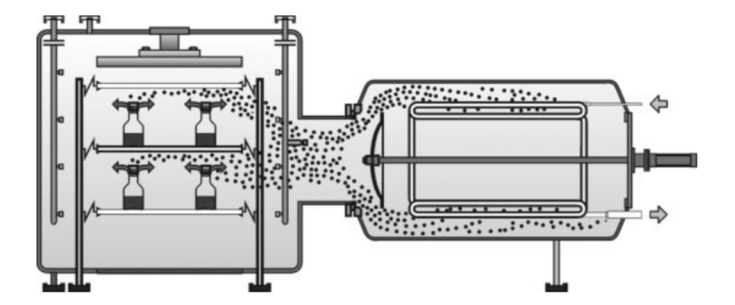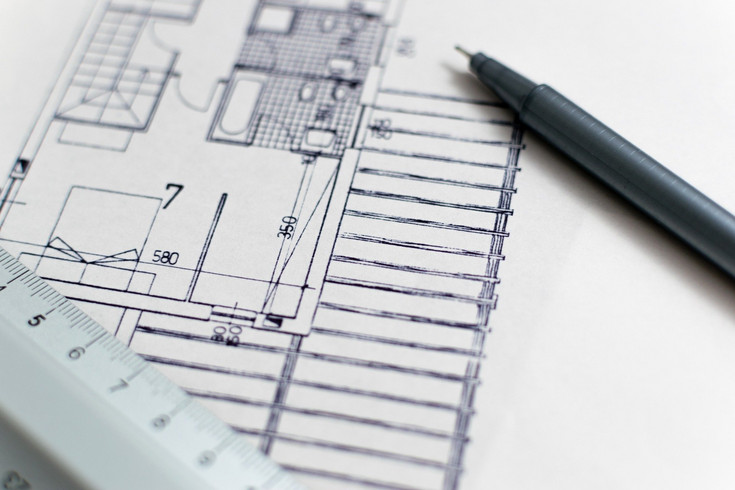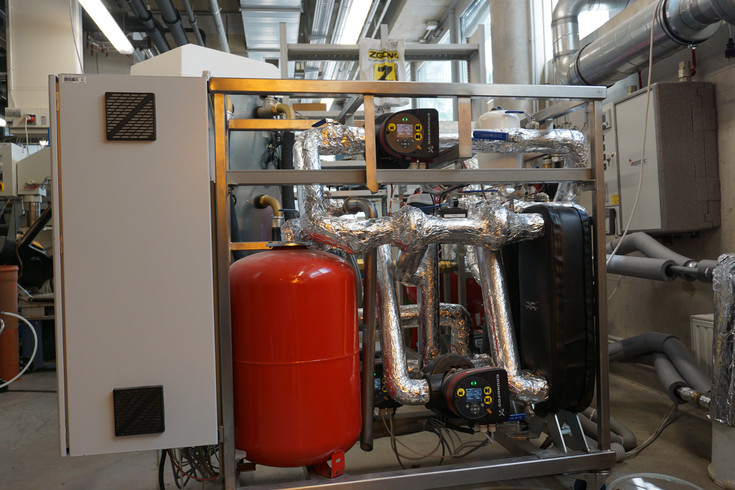Refrigeration technology, heat pump systems and smart controlling
Refrigeration and heat pump systems play an important role in energy technology for heating and cooling.
Particularly in the field of building air conditioning and heating, these systems are an energy-efficient way of producing heat and cold with low energy input. But heat pumps can also make a key contribution to process heating and cooling. High-temperature heat pumps in particular can reduce CO2 emissions in the industry. Optimization potential can also be found in special refrigeration applications such as freeze drying.
At BOKU, research is being conducted on innovative refrigeration technology systems, but also on intelligent control concepts for these systems in the industrial, commercial and building field. For further information, please contact DI Dr. Magdalena Wolf.
Current research initiatives and projects:
Refrigeration and heat pump technology, freeze drying, process simulation, exergy analysis, smart and innovative control systems
Sani60ies
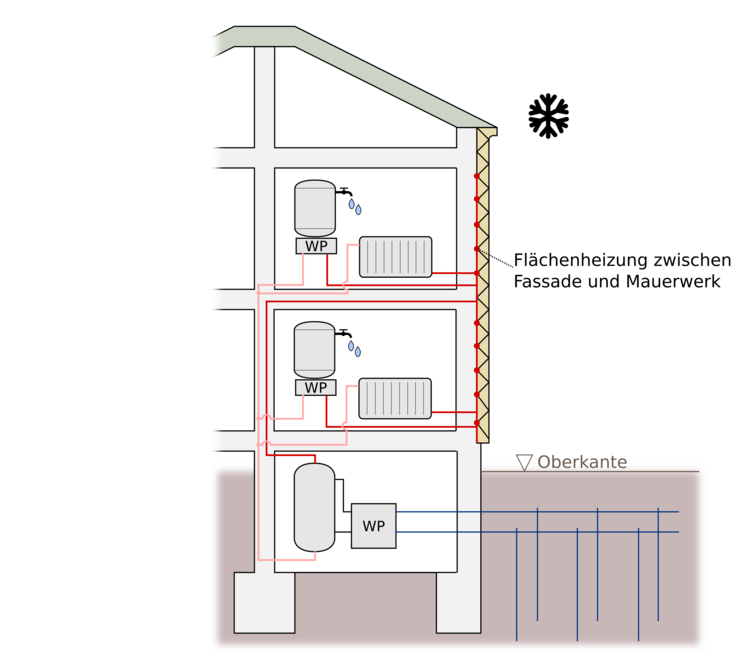
Demonstration of minimally invasive thermal and energy retrofits of classic 1950s - 60s apartment buildings
The project Sani60ies develops, tests and demonstrates a minimally invasive and socially acceptable refurbishment system with façade-integrated building component activation. The technology is being tested in "warm" refurbishments at two smaller properties before it is application in a 1960s housing development with over 200 apartments. The transferability of the system to the numerous building stock of unrenovated housing estates is the declared goal of the project.
ZQ3Demo
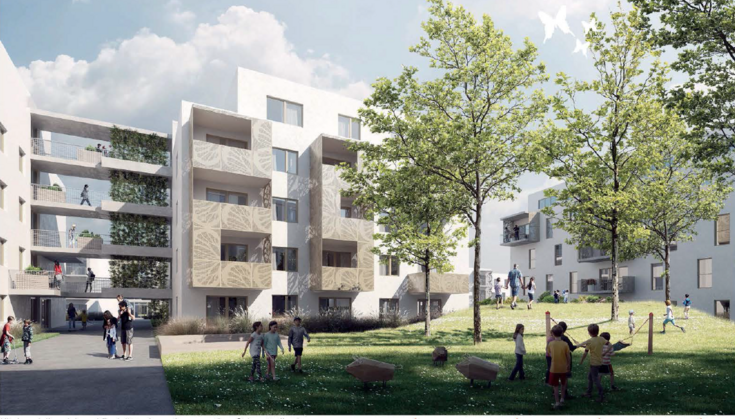
Implementation of urban future quarters with networking of actors and legal and economic replicable solutions
High proportions of highly volatile, renewable energy sources place great demands on our current energy system. The fundamental objective is that even with a high level of on-site energy generation, the public grids should not be burdened by additional peaks due to high feed-in (PV) or simultaneous consumption (e-cars, heating peaks).
In dense urban areas in particular, it therefore makes sense to optimise buildings not as individual systems but as part of a larger neighbourhood development in order to exploit the full potential of networked systems. In this way, renewable energy systems can be integrated more efficiently into urban structures and higher-level energy grids and storage potential can be utilised through different uses and load shifting. However, there is currently still a lack of systemic implementation of individual technologies and, consequently, of realised examples of showcase districts.
The aims of the project are to promote the replication of showcase neighbourhoods by demonstrating them in practice with accompanying research, monitoring and operational optimisation, as well as the further development of technical system solutions with regard to architecture, building energy systems and neighbourhood networking. A central element is the testing of an innovative, predictive control concept that regulates the heat input into the home not only according to comfort but also according to ecological and economic factors. To this end, 15 research flats were selected in the Campo Breitenlee future neighbourhood to be equipped with this special controller in order to test the effectiveness of the controller in practice.
The implementation in the neighbourhoods will provide the real-life showcase projects that are so necessary for the construction sector, which will be validated as part of the project through monitoring and accompanying research. The experiences will be processed in key findings to provide a sound data and knowledge base for future showcase neighbourhoods.
Optimization of refrigeration systems for freeze drying
Optimized plant dimensioning of freeze dryers refrigeration system based on process simulation
Freeze-drying processes are widely used in food and biotechnology. Freeze drying systems must be able to generate temperatures down to -80°C and vacuum down to 0.001 mbar.
These high requirements can also be applied to the refrigeration technology used in freeze dryer. In practice, plant planning and design is primarily based on empirical valuee. Technical guidelines and standards are lacking.
In a research cooperation with a company from the freeze drying sector, simulation-based calculation models are being developed in order to provide a technically sound process dimensioning.
Alpenland Zukunftshaus Wolkersdorf
Hygienically safe domestic hot water production with cascaded heat pumps and innovative, forecast-based controller for TAB
An innovative multi-storey residential building with thermal activated components is equipped with a hygienically safe cascaded water heating system and a model predictive control concept.
In the research project, different, cascaded water heating methods will be techno-economically investigated and evaluated. The most efficient system will be implemented in the planned residential building. In addition, an innovative control concept based on weather forecast data will be implemented for optimized heating and cooling operation.
High temperature heat pump testing station
Efficiency verification of high temperature heat pumps
To measure high temperature heat pump systems, a good infrastructure is very important because high temperature and pressure levels of the high temperature heat pump system requires special demand for the testing station. The hole system is designed for nominal pressures up to 25 bar and maximum temperatures of 200°C and covers a power range from 15 to 50 kW.
The testing bench runs with an energy efficient recycling heat system and allows individual adjustable temperature levels in the heat circle. With comprehensive measurement techniques, the detection of relevant parameters for scientific research is possible and allows the calculation of major energy operating numbers.

![[Translate to English:] DI Dr. Magdalena Wolf © Kamiki](/fileadmin/_processed_/6/d/csm_foto2_bewerbungsfoto_45x60mm_v3_e3696e968f.jpg)
